We settle in the confined space. Two bunks up, two seats (later to be transformed into bunks) down. One side is ours, the other side belongs to the young couple. Good-bye, Kiev, let’s go westward. Go West...
As the train rushes forward, a conductor enters the compartment. I suppose she just wants to inspect the tickets, but to my surprise she takes them, folds them neatly and puts each of them into a little pocket with a corresponding place number in her leather-bound file. Are passengers considered incapable of keeping them at night? Or do the conductors perform some mysterious rituals with the tickets? Who knows. And it’s not the only peculiar thing aboard the train – the taps that need to be pushed from below and held firmly to make the water run present a bit of a puzzle as well
We sip tea, watch the darkness fall behind the windows. The couple are early to bed and generously offer to take both the upper bunks, retreating there and quietly whispering to each other. Night owls plunge into a game of chance. It’s been a constant bone of contention between me and my host – shall a dice game be played with six of the little buggers or five? Six, say I. Five, insists MacRua. And pulls out five big plastic dice. I counter with six small glass ones. But instead of a culmination of the long-standing dispute, it turns out that the games don’t differ much – a slight shift of priorities, slightly different assortment combinations, and that’s it. Maybe the five-dice game was invented by a sad guy who lost one of his trusty dice, but didn’t want to give up gambling.
As I lay myself down on the bunk, I notice that it’s quite a pleasant experience – thanks to the steady movement of the train it resembles a massage bed. And the clanking of the wheels is quite a powerful lullaby.
***
Brilliant misty morning. The rolling countryside looks like fairytale realm behind the window. Fields, clutters of bushes and trees hugged by the tentacles of soft morning mist, azure sky overhead. Here and there, a shepherd herding cows or goats. From my homeland, I’m used to the sight of a village after village lining the tracks. But here it is only fields and meadows and greenery; a house is a rare sight. Wonderful.
We walk through a busy railway station and emerge into the heat outside. MacRua, as a proper tour-manager, picked out two suitable hotels in the city – the question is how to find them. The couple who shared the compartment with us suggested to take a tram no. 9, so we head to the the tram stop. It seems to be the final stop – the tracks form a loop. People sitting on benches, holding luggage, waiting. The only problem – there are absolutely no trams in sight. Final stop without any trams, that’s a bit suspicious. We mess about for a while, buy a city map, and then give up and head towards the horizon, where the city – and hopefully something resembling a main street – looms. The tram tracks lead us, still quiet and deserted. And they have good reason: several hundred meters walk, and the mystery is solved. Heavy machinery, sweaty construction workers, a pile of cobblestones and gaping holes where the tracks should continue. Waiting for a tram would be waiting for Godot.
Reaching the main street, we finally glimpse the elusive trams. As we are waiting at a stop, a massive noisy truck pulling an empty tram rumbles from the opposite direction. Taking the poor thing to a tram hospital... or a tram cemetery. And I’m going to see the same sight one or two more times before I leave the city. Looks like not only passengers, but even the trams themselves have a troublesome life here.
Short tram ride, short walk, consulting the map from time to time, and we arrive at the hotel. Brief inspection of the room follows. Window overviewing a quiet backyard. Television which works only if the antenna is turned at a certain angle and nobody moves around. In the shower, a blue-marked tap from which hot water runs. (I imagine a poor wretch turning it at full blast and pointing the shower at his face...) Result of the inspection: OK. But it’s time to explore the city.
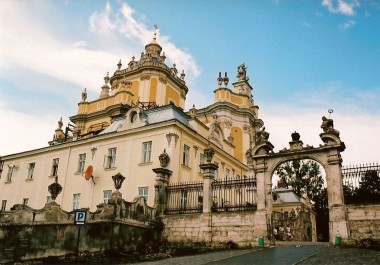
As the afternoon melts into evening, we turn into another of the countless narrow streets in the centre. „Look,“ MacRua points at the street sign. „Jan Žižka’s Street.“ A street named after the famous Czech warrior from centuries long gone? I’m impressed. Then I look around the street. It’s short, very short, a forgotten shady alley connecting two main streets. Not a living soul in sight. And it’s the shabbiest street I’ve seen in the city. Plaster peels from the walls, some of the windows are boarded up. Air of desolation hangs over the place as if it has been sleeping for a long, long time – maybe since Žižka fought his battles? One single car stands at a curb – its broken headlights staring ahead like blind eyes, flat tires a sad reminder that this vehicle has probably found the place of its final rest. What a tribute to a military leader who never lost a battle in his life...
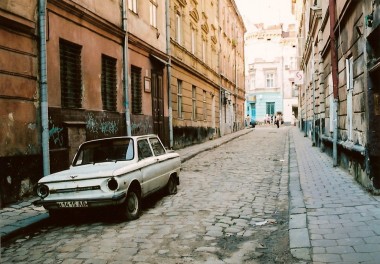
Darkness falls quickly and we head back to the hotel. It’s a matter of self-preservation. Last year, I was warned that Kiev streets are dark. Well, maybe, but still you can find your way when the cloak of darkness covers the city. Lviv is another story. When we walk out from a pub to the blackness outside, my first impression is that there are no street lamps at all. In fact there are; some kind of lights are hanging over the middle of the street. They pretend to cast some light – however it’s nothing but pretense. One more hour, and I doubt we would be able to find our way back without a flashlight. Lviv, the city for adventurers. Lviv, the paradise for torch sellers. Lviv, the dream of energy-saving ecologists. Lviv, beautiful dark Lviv – but it’s better to find the way home when it’s still possible.
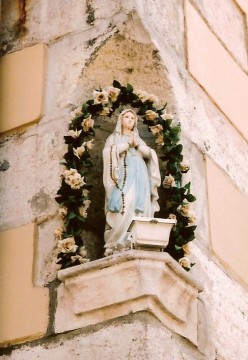
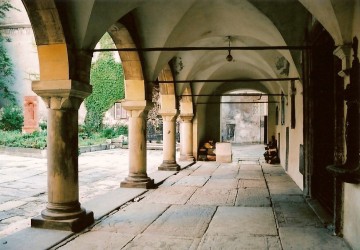

After getting rid of our luggage, we breakfast in a cozy pizzeria. (And I experience one more language fiasco there: Prodded by my companion, I step up to the girl behind the counter and politely ask her where I could find a toilet. I ask in English, but speaking slowly and pronouncing clearly, having been assured that the local word for the facility in question sounds almost the same as the English one. The girl looks at me, obviously puzzled. I repeat my question, even more slowly, with my most polite smile. The girl looks around helplessly and then turns her back on me. Literally. Conversation over.) Full on delicious pizza, we head to a green hill towering over the city. It looks pretty provocative on the map, with a path climbing upward, winding like a snail’s shell. It’s another unbearably hot day and having reached the top, we stand on hot stones, exposed to the blazing heat. But it’s amusing to have a bird’s eye view over the places we visited earlier. All of them seem far away, making one feel like like a champion in long-distance walking. Once again, I’m amazed at the wildlife thriving amidst the city life – huge yellow swallowtail butterflies are fluttering around.
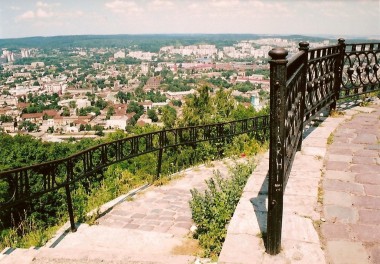
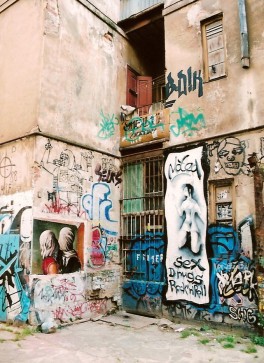
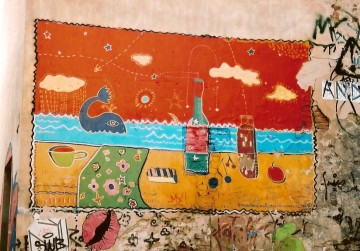

Part 2
Part 3

photos © Zuzana, 2006